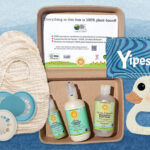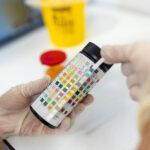Give me a boost
Although your baby is tiny, her brain is anything but: […]

The basics
Meeting your baby’s needs by providing nourishment, comfort and love is one of the most important things you can do for her brain development. When a baby’s basic needs aren’t met, it can negatively affect her overall health by monopolizing resources that are usually dedicated to brain growth for basic survival instead. Respond as soon as possible to your baby’s needs, and don’t worry about spoiling your infant: When you soothe and nurture your wee one, positive circuitry is built in the limbic area of the brain, which relates to emotions. Human touch plays a huge part in proper neural development—studies have shown that babies who are not frequently touched have brains that are smaller than normal for their age—so snuggle and hold your baby often.
Let’s talk
Your voice is a powerful brainpower-boosting tool. Talk to your baby frequently—about the weather, the sights around you, what you’re doing while she’s watching from her bouncer—it doesn’t matter what you’re saying, just keep a continuous conversation going with your mini-me. Once your babe is big enough to start vocalizing herself, respond to her coos. And don’t be afraid to use that obnoxious, drawn-out mommy voice (formally known as “parentese” or “motherese”). The high pitch and slow syllable definition stimulate the areas in the brain that help your little one understand speech and produce language.
Read up
Your voice is an even better booster when it’s reading aloud. While your wee one might not comprehend your words, she’s learning to understand the rhythm of language and acquiring listening skills she’ll use for the rest of her life. Sharing stories helps build your baby’s receptive language (the understanding of spoken words). As she grows and begins to “read” to you, she’ll start to develop her expressive language. Anything you read (yes, even that novel you’ve been perusing a paragraph at a time for the past three months) will have positive effects; modulating the tone of your voice will offer a soothing twist to the tale. Once baby is old enough to view the pages with you, choose books with large, colorful pictures and opportunities for enhancement. Point out colors, animal sounds and shapes. She might not repeat them just yet, but she’s absorbing the information for future reference.
It’s all play
Playing isn’t just fun and games—it also provides ideal learning opportunities for your baby’s growing brain. While developmentally appropriate toys can give your baby a boost (most are designed to encourage an understanding of cause and effect, object permanence and other important dexterities), you can also teach baby a lot with nothing more than your two hands and 10 fingers. Simple hand games and rhymes—think peekaboo, patty-cake, and itsy-bitsy spider—are beneficial to your babe’s development. You can also find learning opportunities in your kitchen: pots and pans, containers of dry cereal and wooden spoons allow for the creation of an at-home, baby-based jam band.
Master milestones
All babies do things in their own time. One little lady might be cruising at 9 months while another may not take her initial tentative steps until after her first birthday. That’s OK! Both scenarios can lead to a healthy, happy baby. What’s important is making sure your baby is achieving her infant milestones at a pace you and your doctor are comfortable with.
“In brain studies, scientists have found that there are critical periods for learning body functions, gross motor movement, fine motor movement and more. When nature’s timeline deems [your baby] ready, a ‘window’ opens in the brain, and almost all of the corresponding learning for baby milestones is done during this time,” shares Engel-Smothers. During these windows of opportunity, specific input and stimuli are necessary for optimal brain development. Your pediatrician can share a list of key milestones and when your baby should master them. Each one is critical in the overall development of your infant. “Each baby milestone, from sucking through jumping off the furniture and beyond, depends on the success of the brain learning the previous milestone. The more that certain neural pathways are stimulated, the stronger and more efficient they become,” Engel-Smothers says.
Where brain development is concerned, the first three years of one’s life are the most important. “From late pregnancy through age 3, baby’s brain grows at an accelerated rate,” notes Engel-Smothers. “It grows to 90 percent of its adult size in the first three years of life.” While you don’t have to start introducing calculus or encouraging fluency in Hebrew during this span—the time for those will be here soon enough!—it is crucial to stimulate and encourage your baby’s brain during this formative time. Keep in mind, though, that the single best thing you can provide your baby with is your attention. Be sure to spend an ample amount of time each day focusing solely on your sweetie (and that means turning off or ignoring all those electronic distractions, like your computer, phone and TV) and reading, playing with, and communicating with her. Simply following your instincts and being the best mother you can be will set your baby on her way to a fulfilling future.







